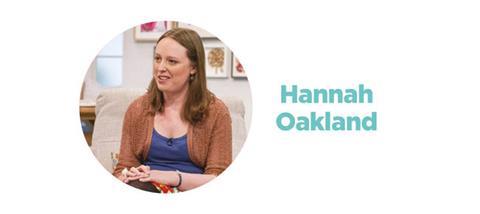
LVDH: You experienced postnatal depression after the birth of both your children. Could you give us an insight into this illness for those who have never encountered it?
HO: Postnatal depression can present in different ways for different people. I felt very grey, and just numb. I looked at my beautiful baby and felt that everything else should feel so beautiful and so precious… but I felt like I couldn’t enjoy anything. Even the things I had enjoyed before I gave birth no longer did anything for me. It made me feel like I had lost who I was. I had slipped backwards; it was as if I was seeing everything from a distance.
I couldn’t feel emotions properly, and when I did feel emotions, it was anxiety or anger. Those were my two options, which were not good ones.
I’ve never felt God’s love so near as when I was at the very bottom
LVDH: So I guess motherhood wasn’t exactly what you were expecting…?
HO: I wasn’t expecting the relentlessness of motherhood, which I don’t think anyone can prepare you for. People tell you about it beforehand, but I don’t think there’s any way of understanding it until you experience it for yourself. I have always been good at being in control of things, at being very independent. When my baby arrived I had a realisation that, if my daughter wanted to be awake, she wanted to be awake. If she needed feeding, she needed feeding. I couldn’t have a cup of tea in peace if my husband was out. I don’t think I had anticipated the lack of personal space or control. I found that really hard. And then, because of the depression, I felt low all the time. I didn’t know how to deal with that, or even what it was.
LVDH: Was it hard to speak up about it to other people?
HO: Yes. I was worried that they would judge me; that they would think I was a bad mother, or that I was failing. I was concerned that if I told anyone official that they might take my children away. There was a lot of fear of how people would see me. I had been trying to hold it together and deal with it all by myself. I had a fear that if I said anything to anybody it would all come crashing down. I remember thinking: if I start crying, I’m never going to stop, maybe ever.
LVDH: What was your relationship with God like through that season?
HO: It was wildly different between my two bouts of depression. The first time, I just didn’t want God to be involved. I was as embarrassed for him as I was for other people. I was embarrassed to tell God. I felt like a failure, that I should be able to cope. I’m a Christian and I should be better at life and motherhood than this. I felt I was failing the promise that when you become a Christian your life gets so much better.
My second experience of depression has been the thing in my life that has had the most profound impact on my faith. I had always related to God by trying to prove myself to him and do stuff for him, but when I was so far down at the bottom that I was no use to anybody, in that time, I felt God hold me. I don’t think I had understood much before about grace and love. I didn’t feel that God had put me in that position or that he was trying to test me; but instead that it was hurting him to see me go through it. He was prepared to sit there with me for as long as it took. I didn’t feel I had to pull myself together or sort myself out for him to love me. I’ve never felt his love so near as when I was at the very bottom. That has changed my outlook on faith.
LVDH: Parents of young children often find church a huge challenge. Has that been your experience?
HO: Thankfully the church that we are part of is very relaxed, so the kids are often running around at the back while things are going on at the front. When my husband was away, I would often go to church so that I could put my children in the crèche and have 20 minutes to myself!
I have found it helpful to be there and be surrounded by people who understand what it is like to have young children. Other churches I have visited create a pressure for children to sit in their seats quietly. I think if I had had that pressure, I might have just stopped going to church.
LVDH: How can we, as Christians, better support new parents?
HO: Support needs to be practical. So often support in a Christian context can mean praying for someone – which absolutely needs to happen – but in terms of new parents who are suffering, what you need are meal rotas and toddler groups where people can come and be themselves, where their children can play and they can meet other parents in the same situation. The Church can provide community and stability at a time when you don’t know what you are doing, or how you are going to make it through.
LVDH: How did you come to a place of being able to talk to people in your church about what you were going through?
Support needs to be practical. So often in a Christian context, support means just praying for someone
HO: It was a strange day. I had gone to church with the children, and my husband was away at work. My daughter was in the children’s group and I had been standing at the back of church, listening to the sermon. The vicar was preaching about fear and how it can control us. He did a short sermon and then said: “Right. I feel there are some people here who have important things to say about this.” And he opened up the microphone for people to come up. I had that awful feeling when your stomach turns and you know someone has seen into your soul. I felt that this was my chance: either I said something then or I never would. So I went up with my baby, Joel, in my arms. A couple of other people said some wise and sensible things, and then I just told the congregation that I was terrified… I don’t know exactly what I said. I cried a lot.
From that moment, everyone came around us. I was so nervous of what they would think or what would happen afterwards. I went home that night and threw up; I think the process of actually saying something had created a physical reaction within me. But somewhere deep inside I knew that this was the only way forward – I had tried to cope on my own [with the depression] the first time around, and I knew I couldn’t do that again. The love that I received from everybody that day began to provide the strength I needed to go back to the doctor and start on medication.
LVDH: I love the title of your book: The honest mums’ club. What’s the story behind the title?
HO: We hold bead parties at St Laurence’s when someone is pregnant. We come together and have some food, or perhaps ice-cream sundaes, and everyone brings a bead with them. During the course of the evening, everyone will give the bead to the pregnant woman and pray for her, or share something with her. Everyone writes prayers and hopes for the mum and baby into a book, and the beads are strung into a bracelet, which the mum can then wear in labour. The tradition was started ten years ago; it’s one of our favourite church traditions.
I was on my way home from one of those evenings with a friend who was pregnant; we had had such a beautiful evening of people sharing real stories. We were sitting in the car outside my house, before she dropped me off, feeling staggered by how precious it all was. We jokingly said: “We should call ourselves the honest mums’ club.” And then she suggested I write a blog post about the bead party and the name kind of stuck.
LVDH: What are your hopes for the book?
HO: I hope it will show people that they are not on their own; it’s OK to get help. I hope it will encourage people to talk about depression, about how hard parenting can be sometimes and about how tricky it can be to have faith through it. I feel like if we talk about it enough, some of the stigma will go away, and fewer people will suffer in silence.
LVDH: Has supporting other parents struggling with mental health issues become something of a mission field for you?
HO: Absolutely. The PANDAS support group I run has no faith link. I feel like my faith has driven my response to having postnatal depression, but this is so much bigger than just a faith issue. There’s no way I could say that I want to run a support group that’s just for Christian mums who are depressed, and leave out everyone else. My faith gives me the impetus to reach out and help people; I don’t want to limit who that includes.
Hannah’s book, which charts her experiences of postnatal depression in the form of an honest, funny, true-to-life diary is called The honest mums’ club: Parenting. Depression. Cake. It is available now.
Lucinda van der Hart is a freelance journalist and mum






































